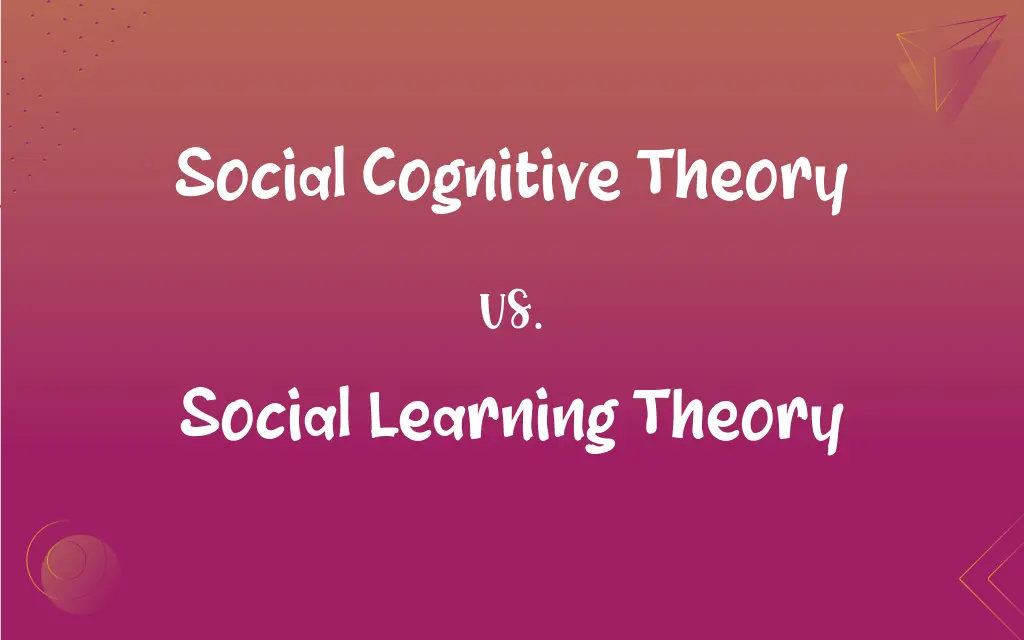Social Cognitive Theory vs. Social Learning Theory: What's the Difference?
Edited by Aimie Carlson || By Janet White || Published on November 20, 2023
Social Cognitive Theory emphasizes how cognitive processes affect behavior and how people can self-regulate behavior. Social Learning Theory focuses on how individuals learn by observing others and the outcomes of those behaviors.

Key Differences
Social Cognitive Theory is deeply rooted in understanding the cognitive processes that influence an individual's actions. On the other hand, Social Learning Theory concentrates primarily on the concept of learning through observation and imitation.
Central to the Social Cognitive Theory is the idea that individuals have the agency and can exert control over their own behavior through self-regulation. In contrast, Social Learning Theory highlights the importance of observational learning, emphasizing the role of reinforcement and punishment in shaping behaviors.
While both theories recognize the importance of environmental factors in determining behavior, the Social Cognitive Theory gives significant weight to personal and behavioral factors as well. Social Learning Theory, however, stresses the role of observed behaviors and the responses they generate.
Bandura, the key figure behind both theories, initially developed Social Learning Theory, which evolved into the Social Cognitive Theory as the role of cognitive processes became more pronounced. This shift recognized the active role cognition plays in understanding and reacting to the social environment.
In summary, while both theories delve into understanding human behavior in a social context, Social Cognitive Theory incorporates a broader range of cognitive processes, and Social Learning Theory zeroes in on learning through observation and the consequences of behavior.
ADVERTISEMENT
Comparison Chart
Primary Focus
Cognitive processes influencing behavior.
Learning through observation of others.
Key Concepts
Self-regulation, observational learning.
Reinforcement, punishment, modeling.
Behavioral Control
High emphasis on personal agency.
Focus on external reinforcement and outcomes.
Evolution
Evolved from Social Learning Theory.
Predecessor to Social Cognitive Theory.
Role of Environment
Interplays with personal and behavioral factors.
Strong emphasis on observational learning.
ADVERTISEMENT
Social Cognitive Theory and Social Learning Theory Definitions
Social Cognitive Theory
A theory emphasizing cognitive processes in understanding behavior.
Social Cognitive Theory suggests that self-efficacy plays a crucial role in behavior change.
Social Learning Theory
A conceptual outline stressing the importance of observational learning.
Social Learning Theory helps in understanding the spread of trends in social media.
Social Cognitive Theory
A perspective viewing behavior as influenced by cognition, behavior, and environment.
Social Cognitive Theory can explain why some smokers quit after learning about health risks.
Social Learning Theory
A perspective on how individuals adopt behaviors by watching others.
Social Learning Theory suggests that teens might try smoking after observing popular peers do it.
Social Cognitive Theory
Framework considering observational learning, self-regulation, and self-efficacy.
Using Social Cognitive Theory, one can understand the influence of media on behavior.
Social Learning Theory
Framework that considers reinforcement and punishment in behavior formation.
Using Social Learning Theory, educators understand the role of positive reinforcement in classrooms.
Social Cognitive Theory
A theory focusing on the role of cognitive processes in behavior.
Social Cognitive Theory helps decode the impact of peer influence on choices.
Social Learning Theory
A theory emphasizing learning through observing others.
Social Learning Theory can explain why children mimic behaviors of their parents.
Social Cognitive Theory
A conceptual framework highlighting the interplay between personal factors, behavior, and environment.
Through Social Cognitive Theory, we understand the impact of role models on youth.
Social Learning Theory
Theory focusing on modeling, imitation, and observed consequences.
Social Learning Theory underpins the idea that children learn aggression from media.
FAQs
How do the two theories view reinforcement?
While both recognize its role, Social Learning Theory places a stronger emphasis on reinforcement and its outcomes.
Does the Social Cognitive Theory discuss observational learning?
Yes, observational learning is a key concept in both Social Cognitive Theory and Social Learning Theory.
What's the central focus of Social Cognitive Theory?
Social Cognitive Theory centers on cognitive processes and their role in behavior.
How does Social Learning Theory primarily describe learning?
Social Learning Theory describes learning mainly through observation of others.
Who is the main proponent of both theories?
Albert Bandura is the key figure behind both theories.
Has Social Cognitive Theory evolved from another theory?
Yes, Social Cognitive Theory evolved from Social Learning Theory as cognitive processes got more emphasis.
Does Social Learning Theory consider cognitive processes?
While it touches on cognition, its main focus is on learning through observation and outcomes.
How does personal agency differ between the two theories?
Social Cognitive Theory places a high emphasis on personal agency, while Social Learning Theory leans more on external factors.
In which theory is self-efficacy a significant concept?
Self-efficacy is central to Social Cognitive Theory.
Can both theories be applied in educational settings?
Yes, both can offer insights into teaching and learning behaviors in educational environments.
Which theory talks about self-regulation?
Social Cognitive Theory emphasizes self-regulation as a core concept.
Do both theories recognize the role of environment in shaping behavior?
Yes, both theories acknowledge the influence of environmental factors on behavior.
Can the theories be used in behavioral interventions?
Absolutely, both theories offer frameworks for understanding and modifying human behavior.
How does modeling fit into Social Learning Theory?
In Social Learning Theory, modeling is a primary way individuals learn behaviors by observing others.
Can Social Cognitive Theory explain the influence of peers on behavior?
Yes, it considers how cognitive processes and observational learning can be influenced by peers.
Is there a focus on behavior outcomes in Social Learning Theory?
Yes, Social Learning Theory emphasizes the consequences of behavior, like reinforcement or punishment.
Are both theories contemporary?
While both have modern applications, Social Learning Theory is the predecessor to the more recent Social Cognitive Theory.
Can Social Learning Theory explain the influence of media on behavior?
Yes, as it considers how individuals learn by observing modeled behaviors, including in media.
Which theory delves deeper into cognitive processes?
Social Cognitive Theory goes in-depth into cognitive processes and their influence on behavior.
How do the theories view the role of punishment?
Social Learning Theory places a notable emphasis on punishment and its outcomes in behavior formation.
About Author
Written by
Janet WhiteJanet White has been an esteemed writer and blogger for Difference Wiki. Holding a Master's degree in Science and Medical Journalism from the prestigious Boston University, she has consistently demonstrated her expertise and passion for her field. When she's not immersed in her work, Janet relishes her time exercising, delving into a good book, and cherishing moments with friends and family.
Edited by
Aimie CarlsonAimie Carlson, holding a master's degree in English literature, is a fervent English language enthusiast. She lends her writing talents to Difference Wiki, a prominent website that specializes in comparisons, offering readers insightful analyses that both captivate and inform.































































